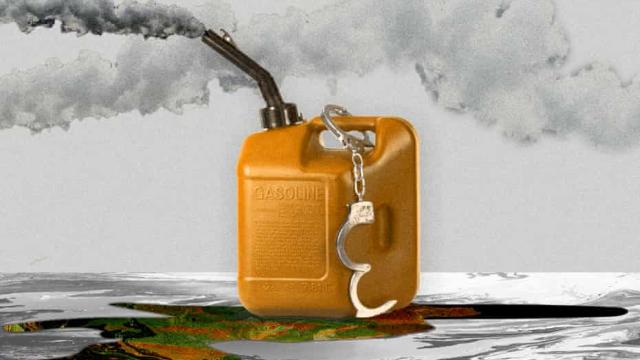
This is the 17th installment in a series about extending the Green New Deal to confront multiple global crises. Read Part I (Deconstructing environmental racism), II (Rural renewal), III (Upcycle the war machine), IV (GND manifestos), V (No oil bailouts), VI (No corporate ecocide), VII (Defund the police), VIII (Zero Covid approach: NZ), IX (Finnish equality lessons), X (Denmark stops drilling), XI (Costa Rica rewilding), XII (Indigenous justice), XIV (No borders), XV (Chile's democratic revolution) and XVI (Undermining neoliberal dogma).
Oil major Shell must cut its emissions by 45 percent from 2019 levels by 2030. This ruling, made in a Dutch court in May 2021, is one example of the tangible wins occurring in court against corporate-driven climate change.
Shell has created around 1.8 percent of all man-made emissions. Like other oil majors, this is more than many nation-states combined.
The question of what power mixes are practical is an essential question for a just green future. Wind, solar and what other renewables? How fast do we get off fossil fuels? Using another meaning of power, climate litigation is a necessary component in the political mix to challenge corporate-government power.
Worldwide climate litigation is a surging movement taking high polluting corporations, complicit nation-states or other climate criminals to court – and increasingly winning.
Successfully suing Shell
The Shell court case was held in the Hague's District Court, about two kilometers south of Shell's international headquarters. The court should not be confused with the nearby International Criminal Court, even if the judgment has global ramifications.
The case began in 2019, led by Milieudefensie (FoE), Greenpeace Netherlands and other NGOs, with over 17,000 Dutch citizens included as co-plantiffs. The case argued Shell violated their human rights, and succeeded.
Not only must Shell reduce its emissions by 45 percent from 2019 levels. It was determined responsible for both its own emissions – extracting and processing oil – and responsible for its consumers' emissions.
In total, Shell cannot get away with greenwashing its image with small moves into renewables, a common practice by it and other oil majors. Instead, Shell must provide low-carbon alternatives.
Nor can Shell hide behind the argument that its business model falls within the boundaries set by national governments. This is important, too. The most powerful countries of the Global North are broadly captured by fossil fuel corporations interests, explained clearly with the failure of nearly three decades of annual climate summits.
This court case sets a precedent where corporate criminals cannot hide behind compliciot politicians. Shell is appealing. Yet the court decision has already had potential ramifications.
The court case could be used to explain why, in late 2021, the company pulled out of Cambo, a planned new oil field in Scottish waters that faced fierce criticism and concerted protests. Around the same time, Shell streamlined its management, keeping its London HQ and closing its Amsterdam offices.
There is speculation that one reason for the latter decision might have been to avoid future Dutch litigation cases.
The past, also, may play a factor. After years of devastating human-rights crimes against the Ogoni people in Nigeria, the UK supreme court recently ruled that Nigerian victims can sue Shell in British courts. And there is a strong movement of British climate litigators ready to continue bringing Shell to climate justice.
Speaking to Rolling Stone after the verdict, Kate DeAngelis of Friends of the Earth US said the Dutch Shell case would also have a “ripple effect.” Climate litigators the world over would look at this case, the arguments used and utilize the tactics and legal arguments in future actions – in particular holding individual corporations accountable for their climate crimes.
For over five years, climate litigation is swelling around the world as an increasingly effective means to challenge the climate crisis (see here and here).
To recap, continual refinements in climate science offer more precision into who has caused which elements of climate damage. Secondly, the climate crisis is more obvious, impacting more victims (to bring cases) and building pressure (albeit incrementally). So juries and judges cannot ignore the ever-worsening reality.
Thirdly, whistleblowing, leaks and investigative reporting show oil majors and their supporters knew they were destroying the planet, and failed to change their business models.
One analogy is with Big Tobacco. For years, the industry was sued unsuccessfully. Expensive lawyers stemmed the tide until a tipping point was reached, followed by an avalanche of successful cases. Returning back to climate litigation, it is not only the Shell case where climate litigation is making breakthroughs.
Suing for climate justice
Between 1984 and 2021, there have been 1,800 climate legal cases – more than 1,000 filed since 2015 – according to research published by the London School of Economics. LSE publishes an annual snapshot of climate litigation here.
Its last report included how “the number of ‘strategic’ cases is dramatically on the rise, suggesting that climate litigation as an activist strategy is becoming more popular than ever. A small but significant number of these strategic cases are targeted at corporations.”
Six innovations in climate litigation cases, successful or ongoing, include:
1) Shareholder litigation: Buying a few shares, environmentalists can sue high-carbon corporations for jeopardizing their share's future income. For instance, ClientEarth ended Poland's new coal-fired power station plans through this strategy.
2) Suing nation-states: In 2021 Germany's climate commitments were deemed “incompatible with fundamental rights.”
3) Suing for direct harm: One ongoing case is being brought by Peruvian farmer Saul Luciano Lliuyas against German energy major RWE for its responsibility melting the glacier that floods his homeland.
Among other examples include Nigerian communities' ongoing legal cases against Shell and other oil majors for past harms.
4) Cities and states (especially in the US) are suing oil majors for knowingly committing harm and adaptation costs.
5) Suing for misleading greenwash, in some cases brought by cities, regions, individuals or organizations. For instance, a group of environmental NGOs including Greenpeace France are suing oil major Total for its green promises.
6) Activism using climate defenses: in US courts (as elsewhere) activists are legally justifying halting, damaging or destroying high-carbon infrastructure, for instance involving pipelines.
LSE's research reveals the ways litigation is also sometimes being used to stop climate action – although overall, their research suggests 58 percent of suits caused stronger climate change outcomes, versus 38 percent that made things worse. This latter statistic shows how the law is often on the side of corporations, much like co-opted lawmakers. Yet nonetheless, litigation remains a way to alter the balance of power.
In the end, climate litigation is not a magic bullet for climate action. Instead, it is one tool in the climate activists' toolbox, which can be used in concert with other strategies like divestment or social movements guided by the mantra: “Keep it in the ground.”
Used creatively, climate litigation is another way cities or regions, NGOs or individuals, can take on the power of planet-destroying corporations. For this reason, it deserves a stronger role in the broader movement for a just and green future.












